19 mei 2022
Climate Day at ESA's Living Planet Symposium
It is climate day on Wednesday 25 May. Here is a run down of the key climate plenary and agora sessions
ESA’s Living Planet Symposium in Bonn, next week promises to be bigger and wider ranging than ever before. If you are a researcher, modeller or policy maker and attending the event, here is your guide to the key plenary sessions and agoras relating to climate.
Networking breakfast 0800-0900 | Club Lounge 1st floor
First-up, you are invited to join the ESA Climate Office, and colleague across ESA for breakfast to kick off Climate day, hear about the work of colleagues across ESA in addressing the climate crisis, their projects and mission development.
Climate Day – Wednesday 25 May
The main focus for climate is on Wednesday. In the morning sessions representatives of UNFCC, GEO ESA and the EO research community explore the role of Earth observation in supporting national action towards Paris Agreement goals. This is preceded by prominent IPCC authors and representatives from the Global Climate Observing System provide an update on the state of the climate, following the recent publication of the Sixth IPCC Assessment report.
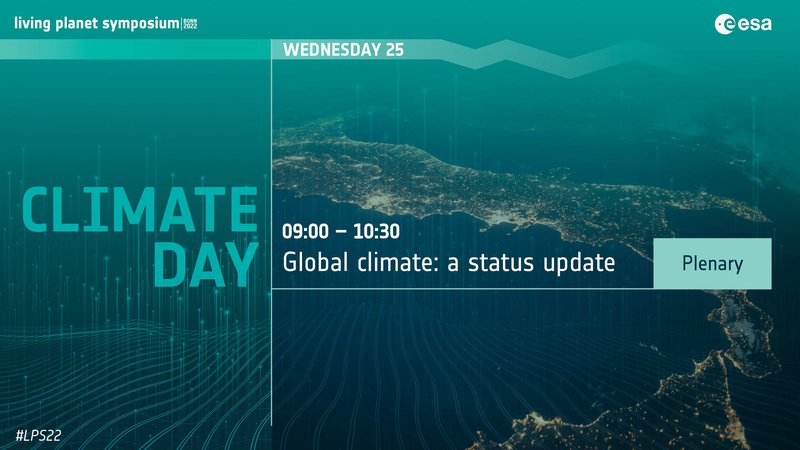
Global Climate: a status update
09:00-10:30 Plenary
Following the publication of the Intergovernmental Panel on Climate Change’s Sixth Assessment Report (AR6), leading researchers and policy makers discuss the best available bio-geophysical science underpinning past, present, and future climate change and the need for systematic observations from space.
Welcome address: Simonetta Cheli (Director of Earth Observation Programmes and Head of ESRIN affiliation)
Chair/Moderator : Anna Pirani ( IPCC WG1 Technical Support Unit )
Panellists: Sonia Seneviratne (ETH Zurich); Richard Jones (UK Met Office); Marie-Fanny Racault (University of East Anglia); Inge Jonckheere (FAO); Han Dolman (Director of Royal Netherlands Institute of Sea Research) (NIOZ)
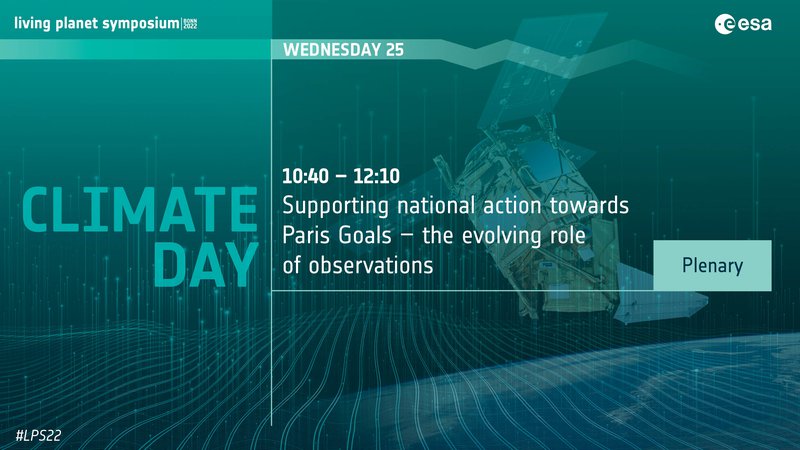
Supporting national action towards Paris Goals – the evolving role of observations
10:40-12:10 | Plenary
This session will provide an overview of EO capabilities and opportunities in relation to; Monitoring greenhouse gas emissions, sources and sinks; the “globally local” agenda for EO applications; Supporting actions and decision making frameworks to build climate resilience.
Chair: Susanne Mecklenburg
Keynote and moderator: Yana Gevorgyan (Director of the GEO secretariat)
Panelists:
- Joanna Post (UNFCCC): Latest updates on the UNFCCC Paris Agreement 1st Global Stocktake, how to involve Earth Observation data and ensure consistency in the reporting across all countries
- Michaela Hegglin (University of Reading): Earth Observation in support for the UNFCCC Paris Agreement
- Chris Merchant (University of Reading): The ‘ globally local’ agenda - the major challenges for the future climate activities
- Chris Rapley (University College London): Creating Agency to Act
Networking session for the remote sensing community to benefit early-research careers
12:20-13:20 | Club Floor Lounge 1
Bridging lunch, and yes we are providing free catering, ESA invite the remote sensing community at all career stages to meet and build connections across organisations. There will be lightning talks from mentors to explore career pathways and for researchers at all levels to network.
And this informal networking opportunity aims to unique opportunity for early career researchers to meet their peers, many of whom have spent significant parts of their career working remotely during the pandemic.
Climate Day - afternoon
The afternoon takes a deeper dive into the climate tipping points and the role of observations to support the development of the latest earth system models.
Climate tipping points
13:35-14:30 | Europa/ESA agora
For the climate tipping points session, chaired by Future Earth’s Wendy Broadgate, a panel will debate discuss research priorities for improving our understanding of the risk they pose and opportunities offered by remote sensing.
The panel comprises Jan Verbesselt of Wageningen University, Sebastien Bethiany from TU Munich, the University of Exeter’s Tim Lenton, Didier Swingeouw of the University of Bordeaux) and Annett Bartsch of B.GEO and science leader on ESA’s Climate Change Initiative Permafrost project
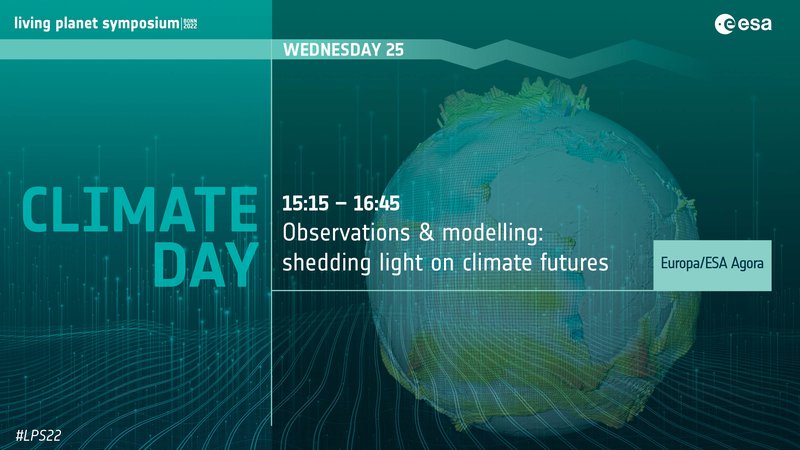
Observations & Modelling: shedding light on climate futures
15:15-16:45 | Europa/ESA agora
As observations become more sophisticated and models more complex, so too do the links between them. Rapidly expanding processing and data storage requirements bring new challenges for model evaluation and validation, and the need for tools, toolboxes and cross community collaboration.
This session addresses challenges and opportunities at the interface of the EO and modelling communities. ESA is taking a lead role in supporting this interface at an international level, reflecting its Member States’ leadership in climate monitoring and modelling. It hosts the coordinating office for the WCRP Coupled Model Intercomparison Project (CMIP) and is the CEOS-SIT chair.
Speakers include Eleanor O’Rourke, director of the recently established, CMIP International Project Office , with panel guests including Jörg Schulz (EUMETSAT), Irene Lake (Director, International Project Office for CORDEX), Susann Tegtmeier (University of Saskatchewan, ESMO Interim SSG Co-Chair), Carlo Buontempo (ECMWF), Axel Lauer (DLR) and Simon Pinnock from the ESA Climate Office.
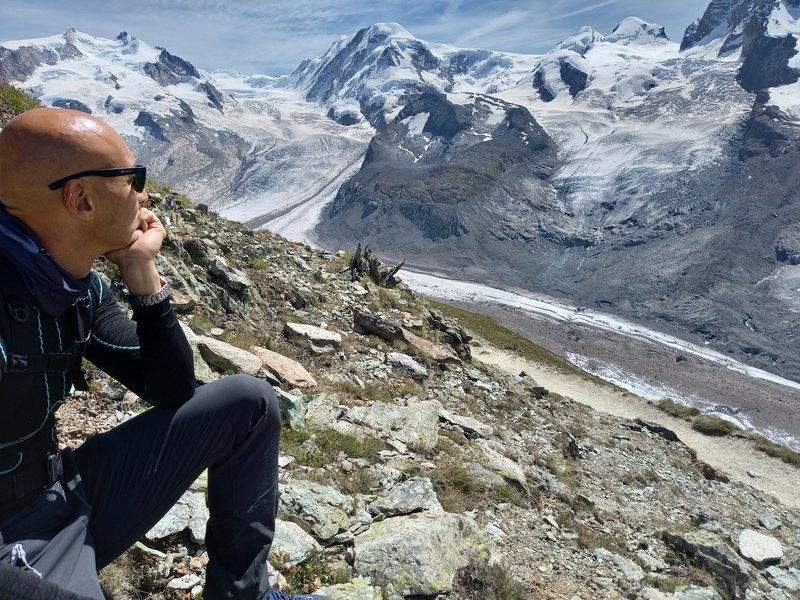
End of day Plenary: Astronaut reflections on the Gorner glacier
17:00-18:30 | Plenary
To end Climate day at LPS, we hear from ESA astronaut, Luca Parmitano, reflecting on the a recent expedition to the Gorner glacier. In Europe, alpine glaciers have become an iconic feature of climate change – the shrinking cryosphere landscape on our doorstep.
Following a screening of a ESA documentary, MELT, of the expedition, hear from scientists how satellites are shedding light on major, synchronous changes that are affecting glaciers world wide and the future missions that are set to continue and improve our understanding of these ice behemoths.
Other climate agora sessions during LPS22:
Monday
Girls on Ice
14:35-15:30 | Sapiens Agora
Women remain under-represented in science and technology. To address this, Girls on Ice, a team of scientists, artists and mountain guides offer young women an immersive outdoor, scientific and artistic experience that aims to boost their self-confidence, remove any self-limitations and help them fulfil their potential.
Here Dr Kathrin Naegeli presents an overview of the Girls on Ice initiative and the expeditions that took place in Switzerland and Austria in the summer 2021, showcasing the science, art and experiences of the promising young women taking part. Two of the participants of the Austrian expedition will also be given the opportunity to present their individual experience (this will be in German). Following this ESA will talk about the importance and the actions that are being taken to heighten the influence and impact of women in science and technology.
Panelists:
- Dr Kathrin Naegeli (University of Zurich/Inspiring Girls Expeditions)
- Yoko Kirchwehm (Girls on Ice Austria participant)
- Daria Rauschelbach (Girls on Ice Austria participant)
- Ersilia Vaudo (pre-recorded video message) (ESA Chief Diversity Officer)
Launch of WCRP's CMIP Office hosted by ESA's Climate Office
15:35-17:15 | Sapiens agora
The WCRP Coupled Model Intercomparison Project (CMIP) objective is to better understand past, present and future climate changes arising from natural, unforced variability or in response to changes in radiative forcing in a multi-model context. CMIP provides the focal point for leading national and international entities in climate modelling and is the main resource for the Intergovernmental Panel on Climate Change (IPCC) assessment
of climate projections. This session will provide an overview of how the newly launched WCRP CMIP International Project Office (CMIP-IPO) will support the coordination of key elements of CMIP activity and data infrastructure, help mobilise sustainable future funding, and maximise the impact and reach of CMIP data,
and help strengthen the connections, cooperation and coordination between models and observations. Through its hosting of the IPO, ESA’s Climate Office and CCI programme aim to facilitate greater use of EO-based climate
observations by the climate modelling community demonstrating ESA’s long-term strategic vision in supporting climate science.
Welcome from ESA director: Simonetta Cheli, Director of EOP Earth Observations
Speakers:
- Detlef Stammer (WCRP Joint Scientific Committee Chair)
- Jean-François Lamarque (pre-recorded video) (CMIP Panel Chair)
- Matt Mizielinski and Paul Durack (pre-recorded video) (WCRP Working Group on Coupled Modelling Infrastructure Panel Co-chairs)
- Susanne Mecklenburg (Head of ESA Climate Office)
- Eleanor O’Rourke (CMIP International Project Office Director from HE Space Operations BV)
Keeping Watch over our Climate: Improving Recommendations from the Global Climate Observing System (GCOS) | 1540-1625 | Sapiens agora
This session will provide an overview the latest GCOS assessment of the status of global climate observations, and the outline of the new implementation plan, which identifies gaps and improvements to be made over coming years. Climate observations supported by GCOS contribute to solving challenges in climate research and also underpin climate services and adaptation measures. GCOS is the main source of requirements and definitions for monitoring our changing climate. The Panel will discuss how to make progress on the big thematic themes of the status report and the new IP: sustainability in observations, gaps in geographical coverage, data stewardship, archiving and access and new needs and requirements.
Chair and keynote: Han Dolman, GCOS Chairman, Director of Royal Netherlands Institute of Sea Research (NIOZ)
Panellists: Clément Albergel (ESA), Thomas Lavergne (Norwegian Meteorological Institute), Carlo Buontempo (Copernicus Climate Change Service)
Thursday
Emerging Tools for climate-smart decision making 1020-1120 | Gemini agora
There is considerable potential to enhance climate adaptation measures through greater exploitation of satellite-based data. In this session we highlight concrete routes to engagement, hearing from research scientists working in decision science and the stakeholders they are working with. With examples drawn from recent ESA-funded projects, this session will demonstrate how EO data is helping to improve climate resilience for communities around the globe, thanks to a range of conditions, and the human and institutional connections that are making this possible.
Chairs: Juan Carlos Villagran de Leon (Head, UN-SPIDER Bonn Office, Office for Outer Space Affairs) & Sophie Hebden (ESA)
Panellists: Marie-Fanny Racault (U. East Anglia), Leonardo Milano (UN OCHA), Roberto Rudari (CIMA Foundation), Markus Enekel (World Bank), Carlos Domenech Garcia (GMV), Inge Jonckheere (FAO)
Journey of a Pixel 14:10-15:10 | ESA/Europa agora

We ESA EUMETSAT and ECMWF take you on the journey of a single pixel, from satellite to research to operations to climate end user, and all the support it needs along the way.
Join the ESA Director of Earth Observation Programmes, Simonetta Cheli, EUMETSAT Chief Scientist Paolo Ruti, ECMWF Director of the Copernicus Climate Change Service Carlo Buontempo, and Head of ESA Climate Office Susanne Mecklenburg as we travel from a pixel's perspective, from space to user.
If that was not enough…
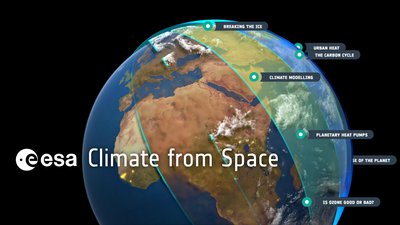
Visit the ESA Climate Office team in the ESA booth during the week, wand explore and interact with a 2 metre diameter illuminated globe which shows satellite-derived data records for around 20 Essential Climate Variables in crystal clear, 4K resolution. Impressed, or don’t have time to visit us download the ESA Climate from Space web app and view, at your leisure, how the climate has evolved on computer or mobile device – and if you want to access the data for research purposes, feel free to download it from climate.esa.int/data.

